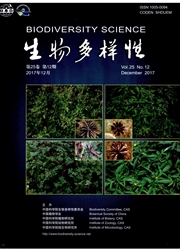

 中文摘要:
中文摘要:
岛屿生物地理学理论的核心过程是岛屿物种的周转,包括迁入与灭绝。本研究旨在探讨扩散能力差异对岛屿繁殖鸟类群落动态的影响。2007年4月至2013年6月,采用样线法调查了千岛湖36个陆桥岛屿的繁殖鸟类,依据扩散能力强弱将其划分为两类,结合陆桥岛屿参数,并运用逻辑斯蒂回归模型和最大似然法,来研究鸟类扩散能力的不同对其周转率的影响。结果表明,千岛湖繁殖鸟类扩散能力强的物种具有较高周转率且受岛屿参数约束较小,而扩散能力弱的物种周转率较低且对岛屿参数变化更敏感。因此,千岛湖陆桥岛屿繁殖鸟类的扩散能力显著影响其群落动态。
 英文摘要:
英文摘要:
Island biogeography theory is an important part of community ecology, and its core process is species turnover, which is determined by species colonization and extinction. A large number of studies have shown that community dynamics of many biotic taxa can be affected by their dispersal abilities. Our study explored the effects of dispersal abilities on community dynamics of breeding birds. Between April 2007 and June 2013, we surveyed bird communities using line-transects on 36 land-bridge islands during breeding seasons in the Thousand Island Lake, China. We divided breeding birds into two types according to their dis- persal abilities. We then used multivariate logistic regression and the maximum likelihood method to estimate the biogeographical parameters and to analyze community dynamics of these breeding birds. Results showed that birds with strong dispersal abilities have been less affected by island parameters than others, with a higher turnover rate. Therefore, the difference of dispersal abilities of breeding birds has significant effects on their community dynamics on the land-bridge islands in the Thousand Island Lake, China.
 同期刊论文项目
同期刊论文项目
 同项目期刊论文
同项目期刊论文
 期刊信息
期刊信息
